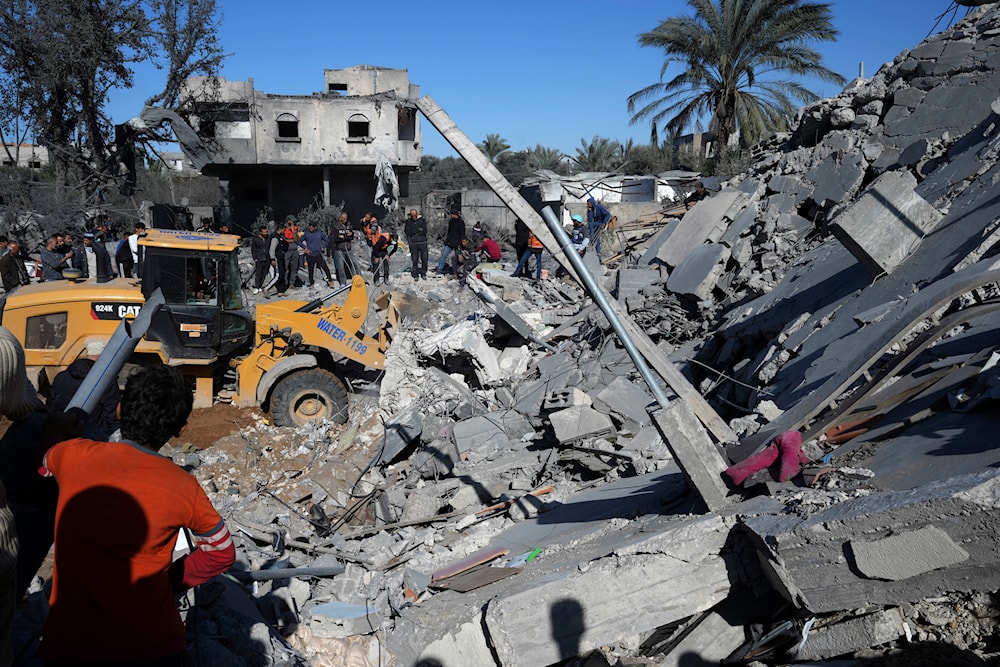Israeli war on Gaza, an end of 'rules-based order': Foreign Affairs
Agnès Callamard sheds light on how the USA has impacted the so-called 'rules-based order' and how the latter is coming to an end amid Israeli atrocities in Gaza.
-

Palestinians search for survivors after an Israeli airstrike on building of Rayan family in Nusseirat refugee camp, central Gaza Strip, Thursday, Feb. 15, 2024 (AP)
The article "Gaza and the End of Rule-based Order" by Agnès Callamard on Foreign Affairs, states that after more than four months since October 7, the series of Israeli attacks on Gaza has been labeled as war crimes and violations of international law which "Israel" justified as "fighting Hamas".
Callamard explains how ever since "Israel" has deliberately displaced Palestinians and besieged Gaza leaving hundreds of thousands of Palestinians deprived of basic human necessities. The Israeli occupation has carried out indiscriminate, disproportionate, and direct attacks on Palestinians and “civilian objects,” such as schools and hospitals. Some 28,000 Palestinians have been martyred, the majority of whom are women and children. A variety of sections of Gaza have been ruined with a fifth of its infrastructure and most of its homes are now damaged or destroyed, making the region largely uninhabitable.
The Israeli blockade on Palestinians denied them adequate food, potable water, fuel, Internet access, shelter, and medical care, all of these actions amounting to collective punishment. In addition, the Israeli occupation is detaining Palestinians in inhumane and degrading conditions while also admitting that some of those detained are martyred. Severe IOF and settler violence against Palestinians have also taken over the West Bank.
Partners in crime....literally
She declares that the United States and many Western countries have continuously supported "Israel", from providing military aid to voting against a cease-fire at the United Nations, cutting funding for the UN Relief and Works Agency serving Palestinian refugees, and condemning South Africa’s genocide case against "Israel" at the International Court of Justice (ICJ), even as the massacres continued to unfold.
Callamard believes that the current diplomatic collaboration in the catastrophic human rights and humanitarian crisis in Gaza is the peak of years of decay of the international rule of law and the global human rights system. She stated that this disintegration began after 9/11 when the United States embraced its “war on terror,” which in her opinion is a campaign that "normalized the idea that everything is permissible" in the pursuit of “terrorists.” Further emphasizing the role of the United States in the war on Gaza, Callamard mentions how "Israel borrows ethos, strategy, and tactics from that framework".
It is as if the grave moral lessons of the Holocaust, of World War II, have been all but forgotten, and with them, the very core of the decades-old “Never Again” principle: its absolute universality, the notion that it protects us all or none of us. This disintegration, so apparent in the destruction of Gaza and the West’s response to it, signals the end of the rules-based order and the start of a new era.
An International system rooted in discrimination and inequality
Callamard discusses the principle of universality, explaining that it is the principle that all of us, without exception, are "endowed with human rights equally, no matter who we are or where we live," emphasizing that it is at the root of the international human rights system. It was the foundation of the Genocide Convention and Universal Declaration of Human Rights, both adopted in 1948, and it proceeded to introduce new means of accountability over the years, including the International Criminal Court, established in 2002. To highlight its importance she elaborated how for decades, that "legal infrastructure" has aided in ensuring that states commit to their human rights obligations as it has defined human rights movements globally and paved the way for the twentieth century’s greatest human rights achievements.
She said that a critic of this system might argue that states have only merely pretended to support the principle of universality as the same century that witnessed human rights achievements also witnessed failures to maintain the equal dignity of all. Some examples are the violence used against the people calling for decolonization, the Vietnam War, the genocides in Cambodia and Rwanda, the wars that followed the breakup of Yugoslavia, and many more. The latter all account for an international system "rooted more in systemic inequality and discrimination than in universality," according to Callamard who further emphasized that "with good reason, one could contend that universality was never applied to Palestinians," quoting the Palestinian American scholar Edward Said “the victims of the victims, the refugees of the refugees,” since 1948.
Callamard concluded "Yet the fate of universality resides not in the hands of those who betray it. Rather, as a perennial ambitious project for humankind, its power rests, first and foremost, in its continual proclamation and in its persistent defense." Her point rests on that even though all throughout the twentieth century, the principle of universality has had countless setbacks, the more dominant direction was toward proclaiming, affirming, and defending it which later changed in the early years of the twenty-first century, with the released the “war on terror” following the tragic events of 9/11.
The USA's "war on terror" at the bottom of it all
For the last 20 years, according to Callamard, the doctrine, and methods of the “war on terror” have been followed by governments around the world further working on expanding the reach and range of state “self-defense” measures claiming it is in the face of a "terrorist threat" with almost no restraints. What is happening in Gaza is a clear example of how both "self-defense" and "countering terrorism" are being used consequently affecting international law and the principle of universality, she explained.
Other examples are American airstrikes in Afghanistan, Iraq, Pakistan, Somalia, and Syria resulted in mass civilian casualties the US military would claim that "it had taken the necessary steps to protect civilians" while providing little explanation as to "exactly how it distinguished civilians from combatants and why, if distinguished properly, so many civilians had been killed."
Callamard stressed that "Israel’s" massive bombardment of Gaza has historical origins deeper than the “war on terror,” including the 1948 intentional and bloody expulsion of roughly 750,000 Palestinians from their homes, the Nakba adding that it is also a twenty-first-century result of the "erosion of international law" as very minimum restraints set by the post–World War II system have been respected. As an example of those who were not respected "those in the UN Charter, in international human rights law, or even under the Genocide Convention," as argued by South Africa.
The USA can but does not want to
Callamard criticizes the allies of "Israel" for not shifting their rhetoric on the war in Gaza once it became evident to them, as it quickly did, that "Israel’s bombing of Gaza was killing thousands of civilians." She urged that all governments, especially those with "influence over Israel," should have "unequivocally and publicly denounced Israel’s unlawful actions and called for a cease-fire, for the return of all hostages, and accountability for war crimes and other violations on both sides," stating that this did not happen.
For the first two months of the war, she said, the Biden administration "largely downplayed the loss of lives in Gaza," failing to condemn "Israel’s" relentless bombings and devastating siege on Gaza while simultaneously ignoring the context of the 56 years of Israeli occupation and instead promoted "Israel’s" counterterrorism framing.
All through the war, the Biden administration backed "Israel’s" tactics showing certainty of "Israel’s unverified and later repudiated claims about Hamas atrocities." The USA has denied publicly supporting key steps that would help save Palestinian lives and instead, at the UN, it vetoed Security Council resolutions calling for humanitarian halting of the war. Furthermore, the USA and several other Western governments cut off UNRWA funding only within days of the ICJ ruling. Callamrad stated that the latter decision " does not just ignore the evident risks of genocide; it serves to amplify and accelerate them," further emphasizing that the USA has the power to influence "Israel" but has willingly chosen not to.
A new era in international affairs
Callamard believes that the rules-based order that has controlled international affairs since World War II is on its way out with no return indicated by "the risk of genocide, the gravity of the violations being committed, and the flimsy justifications by elected officials in Western democracies."
She stated "The consequences of this abandonment are all too apparent: more instability, more aggression, more conflict, and more suffering. The only check on violence will be more violence. The end of the rules-based order will also bring spreading and palpable anger across all layers of society, in all corners of the earth, except among those positioned to reap whatever sullied rewards can be extracted from the breaking international system."
Callamard believes that steps can be taken to stop this worst-case scenario the first being an immediate cessation of all military operations in Palestine with the immediate release of all remaining Hamas captives and of all Palestinians unlawfully detained by "Israel", and with the lifting of the siege on Gaza stressing that the ICJ’s provisional measures to prevent genocide in Gaza must be fully implemented.

 9 Min Read
9 Min Read











